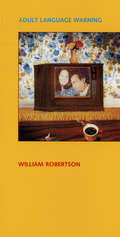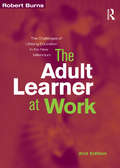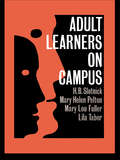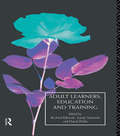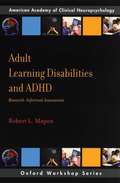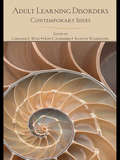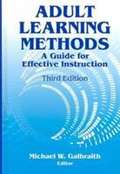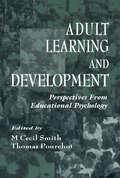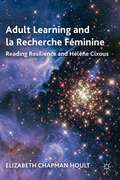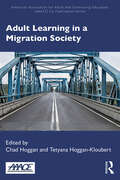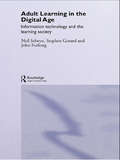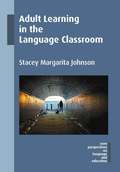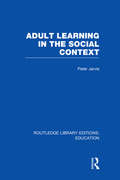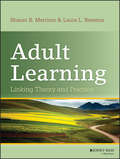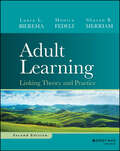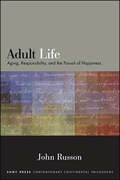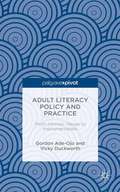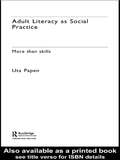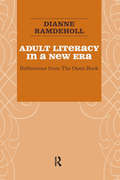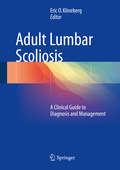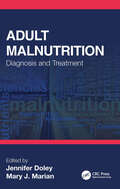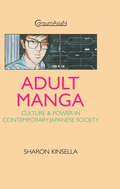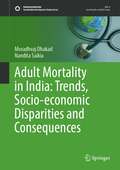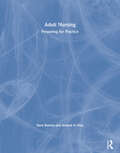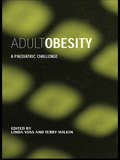- Table View
- List View
Adult Language Warning
by William RobertsonAt the time of writing this book, William Robertson was a homemaker. His poems bring a new passion to the ancient domestic scene, and to everything else he looks at out of that often-turbulent centre. He ventures with care "into a swelling sea/ of silted meanings" equipped with his own elegant flexible vernacular, shaped precisely to the task of lighting up the trials and wonders of ostensibly ordinary days. These poems ring like crystal-hard edges of a tender heart.
Adult Learner at Work: The challenges of lifelong education in the new millenium
by Robert BurnsKnowledge is one of today's few meaningful resources. Equip yourself to ride the rollercoaster of racing change, globalism and technological super-innovation that is life and work in our age.Completely revised and updated for the 2000s, The Adult Learner at Work, 2nd edition is for educators, trainers and managers who want to stay in touch with the latest thinking in their fields. Dr Robert Burns explains the important changes that have swept through the field of post-compulsory education and the worldwide swing to the lifelong learning as the gateway to a learning society. When work, education and life satisfaction can truly intermesh, sustainable prosperity becomes achievable. Robert Burns explores such questions as:* What conditions have created lifelong learning, learning societies and learning organisations?* How have government and business responded?* What methods and processes enhance the learning potential of adults?* How can we motivate adults to learn?* What are the effects of advancing age on our ability to learn?* Is competency training an effective tool for encouraging learning?This new edition examines how and why we must facilitate the learning potential of all members of society. The Adult Learner at Work, 2nd edition provides an attractive vision of the development of learning environments in the workplace and the community setting-integrating skill learning and personal development using well founded principles of adult learning.
Adult Learners On Campus
by Mary Lou Fuller H.B. Slotnick Mary Helen Pelton Lila TaborThe opportunity for a "second chance" is a growing phenomenon. Some members of the Adult Learners Consulting Group, a dozen or so faculty and graduate students at the University of Dakota, who have a general interest in the related processes of learning and teaching, investigated the specific concern about the ways older-than-average students learn and the instructional methods most appropriate for them. They recognized that for both the older student and the teacher of the older student there are problems and issues that are different from the average student or student/teacher relationship. In addition to presenting an integrated picture of adult learners on campus, this book also provides some teaching techniques that can be used in the classroom tomorrow.; It is aimed at teachers in further and adult education, trainers in all disciplines, researchers in adult and continuing education.
Adult Learners, Education and Training
by Richard Edwards Sandy Sieminski David ZeldinFirst Published in 1992. Routledge is an imprint of Taylor & Francis, an informa company.
Adult Learning Disabilities and ADHD: Research-Informed Assessment
by Robert L. MapouThe book provides scientific and practical guidance on assessing learning disabilities and ADHD in adults. Topics include definitions of disability, assessment, and management approaches (from medications and therapy to educational and workplace accommodations), and assistive technology and software. The book is aimed at clinical neuropsychologists and clinical psychologists who are involved in the assessment and management of adults with learning disabilities and ADHD.
Adult Learning Disorders: Contemporary Issues
by Lorraine E. WolfRecent advances in neuroimaging and genetics technologies have enhanced our understanding of neurodevelopmental disorders in adults. The authors in this volume not only discuss such advances as they apply to adults with learning disorders, but also address their translation into clinical practice. One cluster of chapters addresses developmental concerns as children and adolescents with learning disorders approach young adulthood. Experts discuss dyslexia, language-based and writing disorders, perhaps the most widely studied group of learning disorders, from the point of view of neuroimaging and genetic underpinnings. Chapters on the neuroscience of nonverbal, math and executive function disorders are also included. Clinically-oriented chapters with case studies, recommendations for accommodation, and considerations for evaluation follow. Study of specialized populations - such as late high school students, college, medical and law students - further demonstrate how our expanded knowledge base may be applicable to clinical practice. The heterogeneity of adults with learning disorders, the complexity of their clinical presentation and co-existing disorders are addressed from both a scientific and clinical point of view demonstrating how empirical research and clinical practice inform each other. This volume will enhance the practice of clinicians and educators working with adults with neurodevelopmental disorders, as well as providing essential current information for researchers of adults with learning disorders.
Adult Learning Methods: A Guide for Effective Instruction (Third Edition)
by Michael W. GalbraithThe third edition of Adult Learning Methods, with revisions, updates, and six new chapters, provides the educator of adults with ways to understand and facilitate adult learning. It is a clearly written guide to understanding the complex aspects associated with techniques and methods of the teaching and learning encounter.
Adult Learning and Development: Perspectives From Educational Psychology (Educational Psychology Series)
by Thomas Pourchot M. Cecil SmithAdult education occurs whenever individuals engage in sustained, systematic learning in order to affect changes in their attitudes, knowledge, skills, or belief systems. Learning, instruction, and developmental processes are the primary foci of educational psychology research and theorizing, but educational psychologists' work in these domains has centered primarily on the childhood and adolescent school years. More recently, however, a number of educational psychologists have studied learning and development in adulthood. The results of these efforts have resulted in what is now called adult educational psychology. The purpose of this volume is to introduce this new subfield within educational psychology. Section 1 focuses on the interplay between learning and development in adulthood, how various forms of instruction lead to different learning outcomes for adults, description of the diverse social contexts in which adult learning takes place, and the development of metacognitive knowledge across the life span. Section 2 describes both research and theory pertaining to adult intellectual functioning, thinking, and problem-solving skills within various contexts. Section 3 describes research in a variety of adult learning domains; discusses the cognitive and behavioral dimensions of reading in adulthood and the applications of reading in real-life circumstances; examines an educational intervention developed to promote forgiveness; and relates the outcomes of an intervention designed to educate parents about their children's mathematics learning. Section 4 summarizes the themes and issues running throughout this, the first book that has sought to span the gulf between adult education, adult development, and educational psychology.
Adult Learning and la Recherche Féminine: Reading Resilience and Hélène Cixous
by Elizabeth Chapman HoultUsing Hélène Cixous' notion of 'l'écriture féminine' as an analogy for transformational learning and an investigative tool, Hoult explores why some adult learners are able to survive and thrive in the education system, despite facing significantly more challenges than the average student.
Adult Learning in a Migration Society (American Association for Adult and Continuing Education)
by Chad HogganMigration is an old, perhaps perpetual, phenomenon. Currently, it is an urgent challenge involving huge numbers of people who leave their home in search of a better life. Differences in language, customs, and norms are often joined by specific manifestations of xenophobia born of particular differences between host countries and their current influx of migrants. In a pronounced way, then, migration reveals important societal questions・of solidarity, of identity, of transition and transformation, of human rights and obligations. The explorations in this collection highlight individual stories of migrants, showcase innovative research methods, and explore concepts and theories that might be usefully applied toward learning needs in a migration society. Including insights from scholars across 14 different countries, this book offers an international perspective on the role of adult education in addressing migration. Such international comparisons hold great potential for seeing new possibilities in any single country, whether in Europe, North America, or across the world.
Adult Learning in the Digital Age: Information Technology and the Learning Society
by John Furlong Stephen Gorard Neil SelwynThis engaging book sheds light on the ways in which adults in the twenty-first century interact with technology in different learning environments. Based on one of the first large-scale academic research projects in this area, the authors present their findings and offer practical recommendations for the use of new technology in a learning society. They invite debate on: why ICTs are believed to be capable of affecting positive change in adult learning the drawbacks and limits of ICT in adult education what makes a lifelong learner the wider social, economic, cultural and political realities of the information age and the learning society. Adult Learning addresses key questions and provides a sound empirical foundation to the existing debate, highlighting the complex realities of the learning society and e-learning rhetoric. It tells the story of those who are excluded from the learning society, and offers a set of strong recommendations for practitioners, policy-makers, and politicians, as well as researchers and students.
Adult Learning in the Language Classroom
by Stacey Margarita JohnsonThis book explores connections between the fields of foreign/second language teaching and adult learning. This interdisciplinary approach serves as a framework in order to: (a) understand the teaching methods that promote the deeper, more critical sort of language learning advocated by scholars and professional organizations, (b) understand how adult students learn and transform through language study, and (c) reinforce the immense value of beginning language courses. Johnson studies a classroom of adult language learners for one semester, exploring issues of motivation and perceived value for these short-term learners as well as touching on issues around intercultural communication teaching and learning. The book will be of interest to adult language teachers as well as researchers studying adult education and second language learning.
Adult Learning in the Social Context (Routledge Library Editions: Education)
by Peter JarvisThis book is a logical progression from The Sociology of Adult and Continuing Education. The author takes a completely new approach to the subject and puts forward a model of adult learning which is analysed in depth. This model arises from the results of a research project in which adults analysed their own learning experiences.
Adult Learning: Linking Theory and Practice
by Sharan B. Merriam Laura L. BieremaSolidly grounded in theory and research, but concise and practice-oriented, Adult Learning: Linking Theory and Practice is perfect for master's-level students and practitioners alike. Sharan Merriam and Laura Bierema have infused each chapter with practical applications for instruction which will help readers personally relate to the material. The contents covers:Adult Learning in Today's WorldTraditional Learning TheoriesAndragogySelf-Directed LearningTransformative LearningExperience and LearningBody and Spirit in LearningMotivation and LearningThe Brain and Cognitive FunctioningAdult Learning in the Digital AgeCritical Thinking and Critical PerspectivesCulture and ContextDiscussion questions and activities for reflection are included at the end of each chapter.
Adult Learning: Linking Theory and Practice
by Sharan B. Merriam Laura L. Bierema Monica FedeliA freshly updated and science-based guide for contemporary adult educators In the newly revised second edition of Adult Learning: Linking Theory and Practice, a team of veteran adult educators delivers an authoritative guide to adult education that is solidly grounded in theory and research while remaining concise and practice oriented. Each chapter is infused with practical applications for instruction you can implement immediately to improve concrete learning outcomes. The authors cover a variety of topics, including adult learning in the contemporary world, traditional learning theories, andragogy, motivation and learning, and more. Readers will also find: Explorations of the brain and cognitive functioning as it applies to adult learners How to adapt and improve the adult learning experience in the digital age Learning and reflection activities integrated throughout each chapter Perfect for master's-level students and practitioners alike, Adult Learning: Linking Theory and Practice is the up-to-date and practical adult education resource that you've been waiting for.
Adult Life: Aging, Responsibility, and the Pursuit of Happiness (SUNY series in Contemporary Continental Philosophy)
by John RussonWhat does it mean to be an adult? In this original and compelling work, John Russon answers that question by leading us through a series of rich reflections on the psychological and social dimensions of adulthood and by exploring some of the deepest ethical and existential issues that confront human life: intimacy, responsibility, aging, and death. Using his knowledge of the history of philosophy along with the combined resources of psychology, sociology, and anthropology, he explores the behavioral challenges of becoming an adult and examines the intimate relationships that are integral to healthy development. He also studies our experiences of time and space, which address both aging and the crucial role that our material environments play in the formation of our personalities. Of special note is Russon's provocative assessment of the economic and political contexts of contemporary adult life and the distinctive problems they pose. Engaging and accessible, Adult Life is for anyone seeking the profound lessons our human culture has learned about living well.
Adult Literacy Policy and Practice: From Intrinsic Values To Instrumentalism
by Vicky Duckworth Gordon Ade-OjoThis book explores the gradual evolution of Adult literacy policy from the 1970s using philosophical, sociological and economic frames of reference from a range of perspectives to highlight how priorities have changed. It also offers an alternative curriculum; a transformative model that presents a more socially just different value position.
Adult Literacy as Social Practice: More Than Skills (New Approaches to Adult Language, Literacy and Numeracy)
by Uta PapenWith a radically new perspective on reading, writing and mathematics for adults, this refreshing and challenging book shows how teachers and curriculum developers have much to gain from understanding the role of literacy in learners' lives, bringing in their families, social networks and jobs. Looking at the practicalities of how teachers and students can work with social practice in mind, Adult Literacy as Social Practice is particularly focused on: * how a social theory of literacy and numeracy compares with other theoretical perspectives* how to analyze reading and writing in everyday life using the concepts of social literacy as analytical tools, and what this tells us about learners' teaching needs* what is actually happening in adult basic education and how literacy is really being taught* professional development. With major policy initiatives coming into force, this is the essential guide for teachers and curriculum developers through this area, offering one-stop coverage of the key concepts without the need for finding materials from far-scattered sources.
Adult Literacy in a New Era: Reflections from the Open Book (Series In Critical Narrative Ser.)
by Dianne RamdehollAdult Literacy in a New Era chronicles the history and development of The Open Book, an adult literacy organisation inspired by the legendary educationalist Paulo Freire, and other political educators. Using participants' own words and experiences, Ramdeholl analyses and investigates adult literacy policy and aspects of the program's history from its beginning in 1984 to its end in 2001. Offering new insights into methodologies of reading, writing, and learning, this book will inspire not only adult literacy students and teachers, but anyone concerned with changing public policy from the bottom up.
Adult Lumbar Scoliosis: A Clinical Guide to Diagnosis and Management
by Eric O. KlinebergProviding a sound definition and review of the pertinent treatment goals for the management of adult lumbar scoliosis, this practical and comprehensive guide covers everything from pre-operative evaluation and radiography to post-operative management and complications. Both non-operative and operative strategies are presented, including minimally invasive techniques, decompression, anterior release, spinal osteotomy, and proximal and distal fixation, with an emphasis on clinical guidelines and management outcomes. The impact and prevention of complications following treatment are also discussed, including the prevention of proximal junctional kyphosis. Concluding with an examination of future directions for research and clinical treatment strategies, the comprehensive approach of this book provides the orthopedic surgeon, neurosurgeon and spinal practitioner with the most current evidence and expert thought about the evaluation and management of adult lumbar scoliosis.
Adult Malnutrition: Diagnosis and Treatment
by Jennifer MarianMalnutrition is a global health problem and results in significant clinical and financial consequences for people, communities, and healthcare institutions. Causes of malnutrition are often complex and multifactorial, and can include acute illness or injury, chronic disease, and a variety of socioeconomic factors. While many professional articles have been published on malnutrition, there is no single source of information that encompasses all aspects of the condition. Adult Malnutrition: Diagnosis and Treatment reviews the risk factors and etiologies of malnutrition, as well as screening, assessment, diagnosis, and treatment to aid healthcare professionals in the identification and successful care of individuals with this condition in a variety of settings. Features Discusses how to identify malnutrition risks through the use of validated nutrition screening tools in diverse settings Provides detailed instructions on conducting a nutrition-focused physical exam, including illustrations depicting differing degrees of muscle wasting and fat loss Presents information on risk factors, diagnosis, and treatment of vitamin and mineral deficiencies, including photos illustrating signs of deficiency to aid in diagnosis Details treatments for malnutrition related to acute illness/injury, chronic illness, social/environmental circumstances, or starvation Reviews challenges and potential solutions to malnutrition identification and treatment in healthcare institutions Edited by Jennifer Doley, MBA, RDN, CNSC, FAND, and Mary Marian, DCN, RDN, CSO, FAND, FASPEN, this book serves as a key text for registered dietitian nutritionists, health practitioners, and clinicians.
Adult Manga: Culture and Power in Contemporary Japanese Society (ConsumAsian Series)
by Sharon KinsellaFirst detailed analysis of the phenomenon in English. Describes and analyses the complex new attitudes to manga since the 1980s. Provocative and timely, the book shows how manga's status in Japanese society is intimately linked to changes in the balance of power between artists and editors.
Adult Mortality in India: Trends, Socio-economic Disparities and Consequences (Sustainable Development Goals Series)
by Moradhvaj Dhakad Nandita SaikiaThis volume provides a comprehensive overview of the adult mortality situation in India. Each chapter ranges from general adult mortality patterns to its consequences in India. It discusses data-related challenges to studying adult mortality and examines the level, trends, and changing patterns, whether convergence or divergence of adult mortality across the regions from 1981 to 2015. Analyzing the mortality risk across different socioeconomic groups of the population in India, it examines the major underlying causes of adult death with a detailed analysis of external causes of death. The volume enhances the reader's understanding of adult health situations through the lenses of gender, caste, religion, rural-urban, economic status, and region of residence, and its severe consequences at the household level. It is a valuable addition to knowledge on demography, epidemiology, health economics, applied statistics, and public health studies worldwide. It is a must-reference work for Master's and Ph.D. scholars to explore India's and low- and middle-income countries' mortality situations.
Adult Nursing: Preparing for Practice
by Dave Barton Andreé le MayA complete resource for your career in nursing; this book gives you a sound knowledge basis for effective care and best practice in hospital and community settings and, alongside this, explores the many routes your professional development can take.Part one explores the key aspects of the journey from commencing your adult nursing studies to becoming a consultant practitioner, researcher, manager or teacher, with the focus always on developing the best possible care.Part two looks at the five major care themes: first contact, access and urgent care; supporting long term and palliative care; acute and critical hospital care; mental health and psychosocial care; and public health and primary care. A holistic and practical approach draws together research, policy guidelines, and nurse and patient experiences.A companion website provides annotated weblinks to useful resources, PowerPoint presentations, interactive MCQs, and an 'ask the authors' feature. Presents the best evidence for practice Reflects UK policy directions and global health trends Text features include clinical case studies, patient perspectives, key points, colour illustrations and activities to aid learning Highlights career pathways and key areas for continuing professional development
Adult Obesity: A Paediatric Challenge
by Linda D. Voss Terence J. WilkinWhile it is increasingly clear that adult obesity begins in childhood, preventing this condition is a major challenge for the pediatrician.Adult Obesity: A Paediatric Challenge highlights the causes and consequences of obesity, bringing a modern understanding to the treatment of a heavily stigmatized problem. This collection of essays, base
